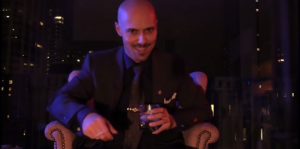Written by neoreactionary blogger Davis M.J. Aurini, the ten-minute short film Lust in the Time of Heartache is less a movie than a multimedia essay, with situations and visuals illustrating the ideas in Aurini’s text, which is essentially a Nietzschean lifestyle manifesto. Aurini, who in his YouTube talks comes across as something along the lines of a laidback, Gen-X D’Annunzio, here affects a hardboiled persona as he offers the voice-over narration to various squabbles and humiliations. He is also seen strolling around Calgary looking passably cool before he is forced to confront a gang of well-dressed assassins representing his weaknesses and inner demons. Thematically, Lust in the Time of Heartache bears striking similarities to Fight Club (1999), but stylistically goes for more of a film noir sensibility as filtered through Quentin Tarantino. This is ultimately a vanity project, but still worth the ten minutes of open-minded viewers’ time.
3.5 out of 5 possible stars. Ideological Content Analysis indicates that Lust in the Time of Heartache is:
6. Pro-tobacco, perpetuating the romance of the philosophical smoker of hardboiled pulp entertainment.
5. Zionist. “The thing I hate most about seeing the powerful abuse the weak is knowing that the weak did something to deserve it.” (cf. Aurini’s exasperating remarks about the CIA being “aligned with the brighter-half of the morality meter” and the leftist establishment trying to “hand Israel over to the Mohammedans”)
4. Sexist! Feminists will be apoplectic at certain of Aurini’s assertions as these could be construed to refer to domestic violence: “Abuser. Abused. Two sides of the same coin.” Perhaps to counter this potential criticism, these reflections have been accompanied by scenes of women mocking men.
3. Activism-ambivalent. Aurini’s writing is catchy, but fraught with a tension and contradiction between a jaded resignation and tortured will to power. Of man’s attitude toward the world around him, Aurini seems to advise a kind of detached voyeurism in keeping with fellow neoreactionary Aaron Clarey’s “Enjoy the Decline” ethos: “So here we are at the end of history. The end of money. The end of hope. The end of purpose. The end of man and the end of woman. Nothing to do then but light a smoke and watch the fireworks go down. Enjoy the final decadent days of our once proud and mighty empire. Watch the leaves turn golden and watch as they begin to fall.” This defeatism, however, clashes with the narrator’s final exhortation to “find something worth dying for”, which in turn conflicts with his earlier admonishment not to “go asking for a better world than this because this is the world we chose. This is the world we deserve.”
2. Anti-materialist. “This is the end state of our materialist fate. Capitalism turned innovators into land rapers and socialism turned charity into oppression.” On the sexual front, Aurini laments “a generation that never learned how to love” and argues, “If you don’t know how to love, all you understand is hate.” “It’s pain that makes us who we are. Embrace it.”
1. Anti-hedonist. “Hedonism always turns out the same. Without love, all you’ve got is sex. And if all you’ve got is sex, you’ve gotta keep upping the ante or else it gets boring.” “We’ve become nothing but a bunch of well-dressed apes” in Aurini’s diagnosis. “It’s the luxury that makes us soft. It’s the enemy that makes us cruel. What you need is a struggle. An enemy to overcome.”
[For more on the Manosphere and figures of the Neoreaction, read “Fear of Commitment or Love of Shekels? Matt Forney’s Awkward Dance with Race“.]




I saw online where some guys said they liked his videos (Davis Aurini) so I checked him out. Could never manage to make it past 30-45 seconds.
He’s an embarrassingly pretentious poser and painful to watch. I guess this is what they mean when they talk about “cringe”.
I hate cringing so I don’t think I could watch this film.
It’s certainly not for all tastes.
You can like him. I just happen to dislike him, but it’s not like I’m a nazi about it or anything.
😀